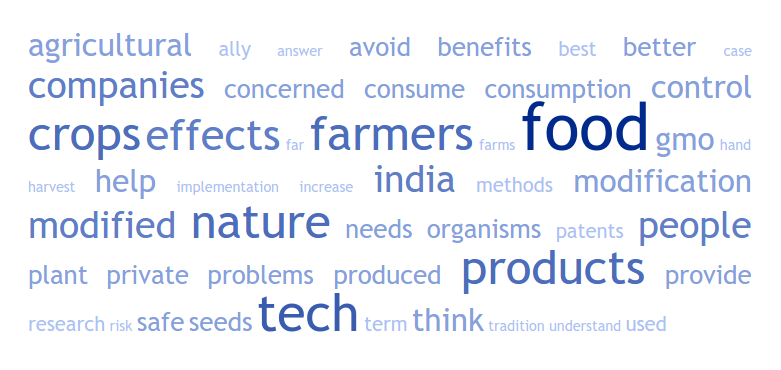| Line 18: | Line 18: | ||
<p>Below is the tag cloud representation of the comments, which we received in our survey.</p> | <p>Below is the tag cloud representation of the comments, which we received in our survey.</p> | ||
[[File:Survey_comments.png|center|780x370px]] | [[File:Survey_comments.png|center|780x370px]] | ||
| − | |||
| − | |||
| − | |||
| − | |||
| − | |||
{{IIT-Madras-Bottom/CSS}} | {{IIT-Madras-Bottom/CSS}} | ||
Revision as of 16:36, 17 October 2016
GMO in India
Our country, India has been progressively adopting GM crops, which has led to a heated debate in our country. This prompted us to investigate GMO related issues by reaching out to it's stakeholders, general public (consumers and farmers), NGOs and regulatory authorities. Our objectives were to answer following questions:
1. What percent of general public have heard of GMO and are aware of it's economical, technical and political implications?
2. What is the perception of public regarding the consumption of GM foods?
3. What do people believe as better in GM patenting regime of the country?
4. What makes a person opt for GM food consumption? Is it better knowledge and understanding of GM?
Considering these, we designed our survey. We conducted our survey in colleges of four different states with the help of SVCE Chennai, IISc Banglore, IIT Delhi and IIT Kharagpur (total 330 responses). We surveyed undergraduates, graduates and professors across various departments and later on categorized them into two groups Biotechnology related and non-Biotechnology related departments. We also made sure that we have enough responses in each category. You can view the survey questionnaire here.
Analysis
We believe that GM crops/foods would be a very important part of our life in future, if not in present. Genetic Modification technology would be developed to an extent that all of us would be satisfied with its technical, economical and political implications. In that regime, we believe that the answers to all of our questions would be 'YES'. Therefore, we have looked at the patterns, which give us 'YES' answers in our questionnaire. The percentage of people responding 'YES' have been color coded like: 0-40% red, 40-70% yellow, 70-100% green. In this way, we can also estimate that how close are we to go green!
We found interesting results in accordance with our hypothesis. We had divided our participants into six groups: Undergraduates, Graduates and Professors, each from Biotech or non-Biotech. A comprehensive analysis of our results can be obtained here.
Below is the tag cloud representation of the comments, which we received in our survey.


